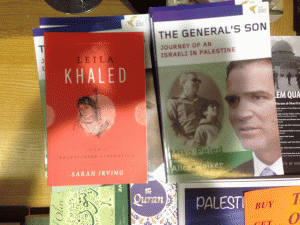Miko Peled meets his tribe at an East Jerusalem cultural beacon
[Jerusalem] Like any other author might, Miko Peled sits at a table on the second floor—the café floor—of a pleasant café /bookshop with his computer and an empty cup of java.
His smartphone is encased in a shell that is the Palestinian flag upon which is written “Free Palestine.” A sticker covering his entire laptop reads “Free Palestine: End the Occupation.”
A tasteful gold chain around his neck holds a single charm: the word salaam, “peace” in Arabic, in an engraved golden medallion.
If you think his message is monothematic, you are right. Peled says “this is my issue. We all have to pick what we are going to do, and this is what I have chosen.”
“I was born here and this is my thing,” he repeats,” in a chat over coffee with The Media Line. “Many people tell me I am naïve or romantic, but so what? I think this is a problem that is solvable and will benefit everyone.” The problem he is referring to is the Israeli-Palestinian conflict. He is insistent. “This can be solved and it will improve the lives of Israelis and Palestinians. It is within close reach.”
Peled, 55 and fighting fit, a karate master and instructor for more than two decades in San Diego, where he has lived for 25 years, is in some ways an unlikely Palestinian freedom fighter.
Hosted by the Educational Bookshop on East Jerusalem’s commercial Salah a-Din Street, Peled, here to tell his story, is the son of a legendary Israeli general who fought in the 1948 and 1967 wars.
The idea behind hosting a writer “is to allow readers to really interact with writers,” the store’s co-owner, Mahmoud Muna, told The Media Line.
“Normally, when we hold a reading, no more than ten people get to ask the writer a question and it’s a short back and forth. The idea here is that a writer gives up half a day, and that readers can come in and chat with him, have a coffee, share a table. My only aim is for a conversation to ensue.”
That conversation did ensue, albeit among the likeminded. A few reporters dropped by to interview Peled and many of his visitors appeared to be old friends. The vast majority of his callers were foreign, neither Israeli nor Palestinian.
Midday midweek, Salah a-Din Street was sparsely populated. An artery leading northwards from Damascus Gate, the street has lost some of its custom and activity since the local wave of violence that started in October, 2015.

Tomes for sale at the Educational Bookshop (Noga Tarnopolsky/The Media Line)
Peled is no stranger to violence. Before renouncing his affiliation with the Jewish State he served in an élite unit of the Israeli army. In 1997, when he was already living in San Diego, his 14-year-old niece Smadar Elhanan, daughter of his sister Nurit Peled-Elhanan, was killed along with two other girls in a Jerusalem suicide attack.
At her funeral, according to his book, “The General’s Son: The Journey of an Israeli in Palestine,” [1] about to be issued in a second edition, the then-newly elected opposition leader Ehud Barak justified his hawkish electoral campaign “in order to win votes he must disguise his real intentions as a ‘peacemaker.’”
Peled replied, “Why not tell the truth … That this and similar tragedies are taking place because we are occupying another nation and that in order to save lives, the right thing to do is to end the occupation and negotiate a just peace with our Palestinian partners?”
Peled is less of a renegade than it may initially appear. His father also rebelled. After the Israeli cabinet ignored Gen (ret.) Matti Peled’s investigation of alleged 1967 Israeli war crimes, the latter transformed himself into a peace activist and leading proponent of Israeli dialogue with the then-outlawed PLO.
Peled senior condemned Israel’s seizure of the West Bank, Gaza, Sinai and the Golan Heights in 1967, calling the war a “cynical campaign of territorial expansion”.
Among Palestinians, many of whom profess a love/hate relationship with him, Matti Peled is still sometimes referred to as “Abu Salam” (Father of Peace.)
“This entire bookstore is an act of resistance,” the younger Peled said, looking around and chatting in easy Arabic with one of the owners. “Because East Jerusalem is the cultural and political capital of Palestine, there is a very strong Israeli push to ‘de-Palestininize’ it.”
He describes himself as “anti Zionist, pro justice and pro democracy.
By getting his message out he hopes to “herald a transformation that will bring about the end of Zionist rule over Palestine and replace it with a pluralistic democracy and equal rights, which will inevitably remedy the long-term injustice to the Palestinian people, 70 years of racist policy.”
All Israeli Jews, he says, are “colonizers and settlers, not immigrants.” Certainly not natives. “We are the children of the colonizers and we are a brutal, racist régime.”
What is his nationality, The Media Line asked. “Russian,” Peled replied. So why not live in Russia? “I don’t have a home in Russia,” he said.
The owner of the coffee shop called up to Peled to say that a woman who wanted to meet him had difficulty climbing the stairs to the first floor. Would he be willing to come down?
Yes, he was. And off he went.